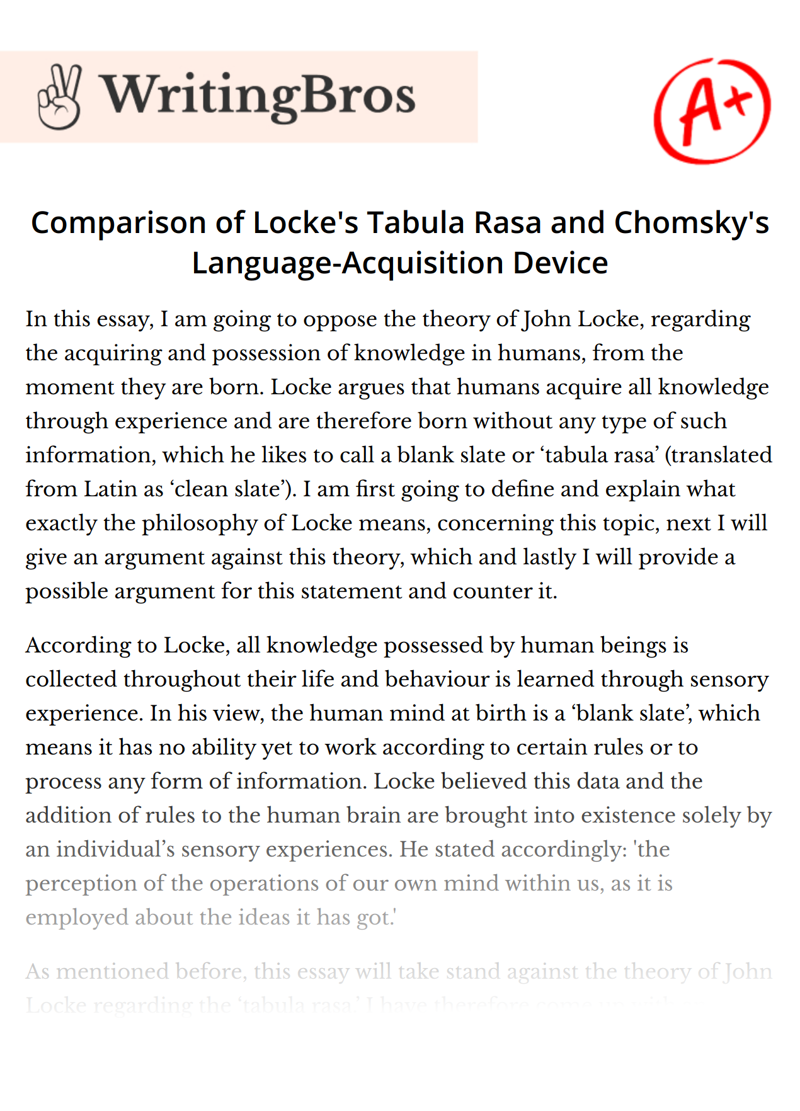Comparison of Locke's Tabula Rasa and Chomsky's Language-Acquisition Device

In this essay, I am going to oppose the theory of John Locke, regarding the acquiring and possession of knowledge in humans, from the moment they are born. Locke argues that humans acquire all knowledge through experience and are therefore born without any type of such information, which he likes to call a blank slate or ‘tabula rasa’ (translated from Latin as ‘clean slate’). I am first going to define and explain what exactly the philosophy of Locke means, concerning this topic, next I will give an argument against this theory, which and lastly I will provide a possible argument for this statement and counter it.
According to Locke, all knowledge possessed by human beings is collected throughout their life and behaviour is learned through sensory experience. In his view, the human mind at birth is a ‘blank slate’, which means it has no ability yet to work according to certain rules or to process any form of information. Locke believed this data and the addition of rules to the human brain are brought into existence solely by an individual’s sensory experiences. He stated accordingly: 'the perception of the operations of our own mind within us, as it is employed about the ideas it has got.'
As mentioned before, this essay will take stand against the theory of John Locke regarding the ‘tabula rasa.’ I have therefore come up with an argument to support my stance towards this particular theory. As Locke explains in his book ‘An Essay Concerning Human Understanding’, all ideas are derived from experience, which can be brought into existence through sensory information, sensations or reflection/introspection.
This idea, however, has been proven wrong by modern science and its understanding of genetics and human development multiple times, in terms of inborn language skills and personality traits. When looking at language, it has been shown that an innate mechanism, which is responsible for acquiring language skills in a quick and efficient way, indeed exists. The linguist Noam Chomsky discovered that all human beings are born with a ‘language-acquisition device’, or LAD. According to him, the LAD contains “the inborn foundations for universal grammar”, that is the fundamental rules that every language relies on, “plus the entire set of inborn mechanisms that guide children’s learning of the unique rules of their culture’s language.” This means that, although the proper speaking of a certain language comes about through experience, the foundations to be able to do so are innate. To support this, evidence has been provided that young children design grammar, even when the language spoken in their environment lacks this, often occurring in Creole peoples.
Another example of scientific findings contradicts Locke’s assumption that “people are free to ‘create’ their own character.” It has to do with behavioural genetics. According to multiple studies, personality traits are strongly hereditary and therefore are fixed and, automatically, unaffected by one’s surroundings. This finding is supported by the case of Phineas Gage (1823), were due to an accident, involving an iron rod damaging parts of his brains, altered some personality traits and therefore his behaviour. This shows that behaviour solely can change when something physically has modified the brain and as a result affected the inherited personality traits lying in these damaged parts of the brains.
Yet, there are is, among others, an argument supporting Locke’s view, in a way. As reported by some studies, the brain and its ability to respond to its environment possess some blank-slate-like properties. Namely, it has been found that brain cells initially are not able to function on their own at birth, but need neighbouring cells to function properly. Later in life, these cells will ‘learn’ how to respond to stimuli and do so without any help. Nonetheless, the way our brains process this data is mostly dependent on the inborn brain structure and physiology. In addition, sensory and motor input travels in foreseen paths inside the brain, which means no experience is needed for this information to ‘know’ which path to take. And although brain cells are not fully developed at birth, it fulfils a specific task in the human body, which does not change due to experience.
To conclude, this essay counters Locke’s theory, that all knowledge comes from experience and people are born a blank slate because behaviour is hereditary and therefore inborn. Although some might say brain cells need ‘experience’ to function properly, they simply need time to develop and already ‘know’ the tasks they are expected to fulfil inside the brains.
Cite this Essay
To export a reference to this article please select a referencing style below

